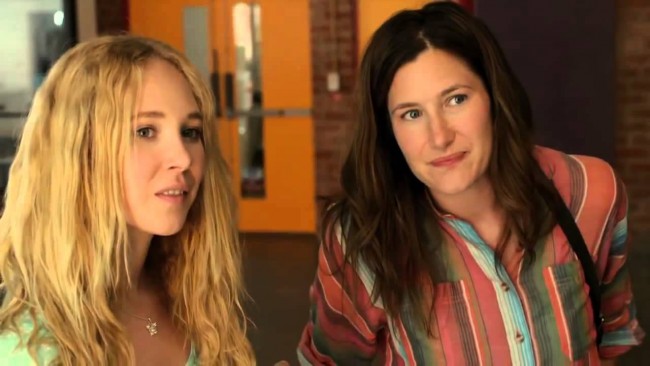
UW-Madison alum Jill Soloway presented her debut “Afternoon Delight” to a packed crowd at the Union South Marquee.
Jill Soloway must love messes; the characters in Afternoon Delight suggest as much. The director and UW-Madison graduate stopped by the Union South Marquee on Thursday for an exclusive screening of her debut feature film with a follow-up discussion on the “feminine” in cinema to boot.
In Afternoon Delight, Soloway combs through a familiar suburban middle-class malaise, using messy, textured, and complex characters and wrestling with their dissatisfaction. As a once ambitious journalism student, Kathryn Hahn’s Rachel is now a slobby mom struggling to occupy the “housewife” mold. She shares a strained relationship with husband Jeff (Josh Radnor), a swamped app developer and signpost for the 21st century breadwinner. In her script, Soloway trades in familiar family roles but never relegates characters to outright stereotypes. Rachel’s stay-at-home mother coordinates playdates and attends PTA meetings, but she sorta sucks at it. Likewise, Jeff’s successful career doesn’t diminish Rachel’s prior desire to pursue a career of her own; it allows her to avoid confronting it altogether.
Afternoon Delight’s flashpoint occurs when Rachel and Jeff’s tepid, coitus-free marriage receives a last-ditch “shot in the arm,” as the couple indulges in a spontaneous night out at a strip club. There, Rachel receives a lap dance from McKenna (Juno Temple), a young sex worker whom Rachel takes in as a live-in nanny. As Soloway mentioned after the film, she never desired to reduce McKenna’s character to a “whore” archetype simply to disrupt suburban milieu. To the credit of Soloway and Temple (who’s great here), McKenna isn’t any more ditzy or naive than anyone else. As a young sex worker, she understands what she’s doing in a career choice that isn’t explained away via a broken home backstory. Rather, Soloway uses McKenna to explore the hang-ups and baggage of those her character meets. Rachel opens her door to McKenna out of a well-meaning but thoroughly misplaced sense of social obligation, and as Soloway again noted, their relationship is a jumble of mother-daughter, sister-sister, and lovers. Likewise, Jeff is at once attracted and slightly horrified at the notion of a live-in stripper, though that surfaces only when he bothers to look up from his iPhone. Rachel’s PTA colleagues exhibit varying degrees of shock, too — their husbands, closer to restrained awe.
Truly, in a sea of hot messes, McKenna’s the smallest problem. In tossing one hot mess at another however, Soloway makes it impossible to assess cause-and-effect in her characters’ existential crises. Is Rachel and Jeff’s sex life rejuvenated by McKenna’s presence? Or in spite of it? Had McKenna never arrived, would the husband of one of Rachel’s buddies have decided to act on sexual impulses anyway? Soloway’s mess is aided by an effusive, collage style photography, but the film’s tumbleweed of emotions becomes so dense that post-screening observations only reveal its faults.
As part of a four-person post-screening panel, Soloway invited several UW faculty members, most notably a Jewish Studies professor. The addition was fitting considering Soloway avoids Jewish stereotypes in Afternoon Delight, but the discussion honed in on the portrayal of Rachel as Jewish rather than assessing Judaism’s role in the film as a tidy Band-Aid. In place of resolution and denouement, Soloway seems confident that Rachel and Jeff’s lighting of shabbat candles provides enough catharsis for their relationship woes. Undoubtedly, faith can ease disorganization, tangled emotions and disordered responsibilities between estranged partners. But is it a wholesale cure? Jill Soloway deserves credit for her film’s appreciation of relationships’ messy complexities. As the ensuing discussion implied however, her filmmaking is just as cluttered.
